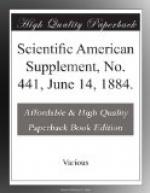Of course, my first visit the next morning was to Mr. McLane to make my report. By this time I had become almost as enthusiastic as Mr. Morse himself, and repeated what had passed between us. I soon saw that Mr. McLane was becoming as eager for the construction of the line to Washington as Mr. Morse could desire. He entered warmly into the spirit of the thing, and laughed heartily, if not incredulously, when I told him that although he had been Minister to England, Secretary of State, and Secretary of the Treasury, his name would be forgotten, while that of Morse would never cease to be remembered with gratitude and praise. We then considered the question as to the right of the company to permit the line to be laid in the bed of the road—the plan of construction at that time being to bury in a trench some eight or ten inches deep a half inch leaden tube containing the wrapped wire that was to form the electric circuit. About this there was, in my opinion, no doubt, and it was not long after that the work of construction commenced. I met Mr. Morse from time to time while he lived, and often recurred to the evening’s discussion at my house in Baltimore.
The above is the substance of what I have more than once related to other persons. I hope you will persist in your design of putting on paper your own very interesting recollections in this connection, and if what I have contributed of mine is of service to you, I shall be much pleased.
Most
truly yours,
JOHN H.B.
LATROBE.
March 3, 1881.




